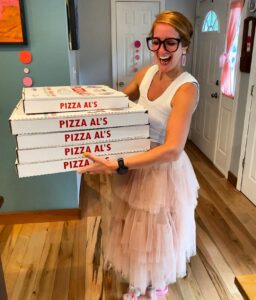I moved to West Virginia from Los Angeles in 2015 and discovered a major lack of support services for individuals in eating disorder recovery. As a person in recovery myself, I knew the importance of finding a supportive community, so I immediately got to work. Through a series of fortuitous events, I got connected with a group at West Virginia University (WVU) working to develop the first collegiate recovery program in our state, and I was invited to join their efforts. The WVU Collegiate Recovery Program became official in early 2016.
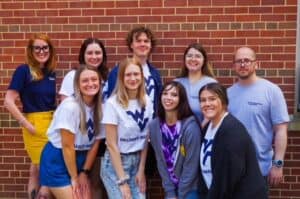
In Recovery
I am a person in recovery from binge eating disorder, anorexia, and exercise bulimia. I used to turn to food to deal with things beyond my control, to stuff down emotions, to find comfort. And the food served me until it didn’t. I became so deeply ashamed of myself, my body, my life, convinced if I just got to a certain weight then everything else would fall into place. Spoiler alert: That didn’t happen.
Once upon a time, losing weight felt like my greatest achievement and the most interesting and important thing about me. When you are in a larger body and lose weight, you are often considered a “success story”, but no one saw the disease that had taken hold and robbed me of years of my life. If I am not recovering, I am dying. We live in a society designed to make us hate our bodies, and I want to help change that narrative by sharing my story and doing meaningful work.
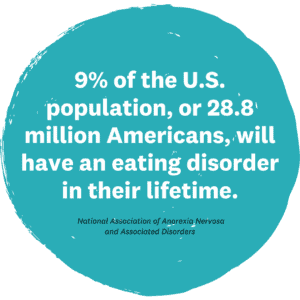
It is not easy to seek recovery from an eating disorder, especially when we live in a society designed to make us loathe ourselves. For people in our culture to talk poorly about themselves is not just accepted, it is expected. And we can easily miss signs of disordered eating and eating disorders because someone doesn’t look a certain way or weigh a certain weight. There isn’t a typical “look” to eating disorders.
Often in media, when we hear about EDs the imagery associated is a thin, white, cis-gendered, able-bodied young woman. Eating disorders can and do impact people from all walks of life. This idea that someone isn’t “sick enough” to need support because of the way they look is damaging on many levels and a myth that needs to be dispelled. A clinical diagnosis, a certain BMI, years of suffering, a hospital stay – these things are not required, and you don’t have to wait until someone is “sick enough”. It is never too early to seek support!
“EVERYONE is Welcome”
We were the first collegiate recovery program established in the state of West Virginia, so we really want to lead the way. We offer support to any student who is in or contemplating recovery, has been impacted by addiction, considers themselves a recovery ally, wants to learn more about addiction and recovery, or is just interested in our programs! That’s a long-winded way of saying EVERYONE is welcome. Our program focuses on holistic well-being and our mission is to help students live a healthy, balanced, and meaningful life. We are dedicated to developing a culture of recovery on our campus through ample collaborations with a wide array of programs, groups, and departments.
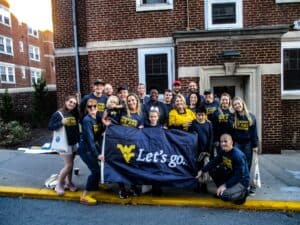
Building Allies, Fighting Stigma
When I came into my role as director, I knew that stigma reduction was an important and imperative endeavor. My awesome program coordinator, Andrew Caryl, and I started offering Recovery Ally trainings for faculty, staff, and students. This one-hour training gives a brief overview of topics ranging from the importance of using person-first language to services offered by our program to ideas on how to talk with someone dealing with an active SUD or ED. We have trained nearly 700 allies to date. 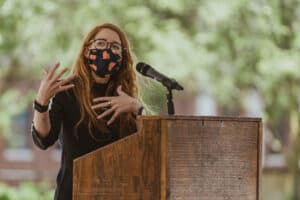
The conversation about turning this training into something bigger had been happening for a while, and finally, I just went for it. I am so grateful for all the help and encouragement I received from our friend Frankie Tack, who serves as program coordinator for Mental Health and Addiction Studies. In Spring 2022, WVU offered the class I designed based on our training, Recovery Allyship and Advocacy, for the first time. To have a for-credit course is incredible and really highlights the dedication WVU has to recovery.
Here at WVU Collegiate Recovery, we offer all sorts of programs; you can learn about all of them on our website! We host a different recovery meeting every weekday at noon, and students can join us in person at Serenity Place or online via our Virtual Serenity Place. We do daily mindfulness and meditation practices, as well. Our students are always cooking up some fun special events—we’ve learned how to make body scrubs, we’ve cooked special meals, we’ve had movie nights, we’ve taken outdoor adventure trips—we are always up to something! In the fall we host Sober Tailgates for every WVU Mountaineers home game because no student should be excluded from normative college experiences due to their addiction or recovery. So, we create a safe atmosphere for food, fun, and fellowship!
